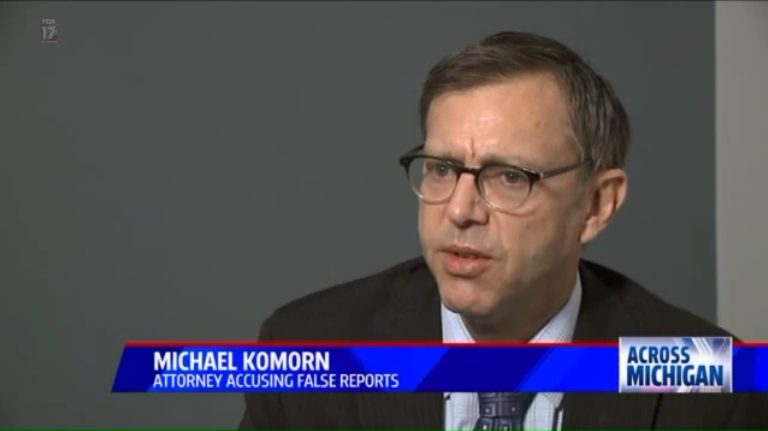
Dec 24, 2015 | Blog, Komorn Law Blog, Medical Marijuana, Medical Marijuana Attorney Michael Komorn, News
GRAND RAPIDS, Mich. — At least three attorneys filed federal complaints Tuesday against the Michigan State Police Forensic Science Division for allegations of serious negligence or misconduct, and to contest grant money the crime labs received this year.
However, officials with both the MSP and the Michigan Attorney General’s Office told FOX 17 their agencies are not conducting investigations into these allegations.
Each complaint filed Tuesday was issued to the National Institute of Justice, Office of Investigative and Forensic Sciences’ Director. Attorney Mike Nichols and attorneys Michael Komorn and Neil Rockind together wrote to inform the NIJ of the accusations that the MSP crime labs have been misreporting marijuana test results and elevating misdemeanors to a felony for the possession or manufacture of synthetic marijuana.
In late October, FOX 17 broke these allegations when Komorn uncovered internal MSP e-mails where some crime lab analysts and directors themselves protested a new THC reporting protocol change. Namely, MSP-FSD Controlled Substance Unit Supervisor Bradley Choate wrote in part, “For the laboratory to contribute to this possible miscarriage of justice would be a huge black eye for the division and the department.”
Komorn accuses the Prosecuting Attorneys Association of working inappropriately with and influencing policy of the MSP crime labs to misreport marijuana extracts, such as oils and edibles, as synthetic THC, a felony. The change seen on lab reports stems from a recent MSP-FSD policy change in the way THC is reported. Analysts are now required to write phrases such as “origin unknown” on crime lab reports when THC is tested when they believe they cannot determine the substance’s origin. Extracts have not been reported in this way for decades before, as one analyst testified back in April.
MSP is a 2015 recipient of the Paul Coverdell Forensic Science Improvement Grants Program.
This year the National Institute of Justice data shows it awarded MSP-FSD $236,488 in funding. One of the stipulations as a grant recipient is to name an independent external government entity to conduct investigations when allegations of serious negligence or misconduct occur. In addition to investigating these allegations, grant recipients are also required to report the allegations to NIJ.
However, records show that MSP-FSD has named its independent external investigating entity as MSP-Internal Affairs. In the filed federal complaints, Nichols, Komorn and Rockind state their concerns that MSP-Internal Affairs is not independent or external from MSP, and also asked for a thorough investigation to be done into these allegations.
“It’s an avenue to bring to light some very real and important concerns,” said Nichols.
“The Michigan State Police Internal Affairs unit is the entity that is set up through the grant that they applied for to investigate complaints,” he said. “Well, that’s the fox guarding the hen house obviously, but it’s the mechanism that’s in place, so I’ve asked for them to utilize it.”
The complaints filed Tuesday to NIJ follow Komorn Law’s complaints regarding MSP crime lab marijuana testing allegations filed Dec. 11 with the U.S. Department of Justice Civil Rights Division, the FBI and the Civil Rights Division for the Eastern District of Michigan, which has referred it to the U.S. Attorney’s Office for the Western District of Michigan in Grand Rapids.
Despite the allegations and filed complaints, MSP Public Affairs Manager Shanon Banner told FOX 17 on Tuesday that the MSP-IA is not investigating. In e-mails Banner said:
“I have confirmed that for at least the last three years, our Coverdell grant application, which was approved by the National Institute of Justice, has included the MSP Professional Standards Section (aka Internal Affairs) as the “government entity” responsible for investigating any allegations of serious negligence or misconduct. The Professional Standards Section maintains responsibility for investigating all allegations of misconduct involving MSP employees. These investigators are housed within the Office of the Director and are not members of the Forensic Science Division.
An internal policy change does not constitute misconduct or negligence. Therefore, no investigation is underway.”
When FOX 17 pressed Banner further she wrote:
“As stated in the earlier response, our designation of the MSP Professional Standards Section as the entity to conduct investigations has been approved by the NIJ for at least three grant cycles. Our review of the guidance provided by the NIJ for this grant did not uncover any federal guidelines as to what constitutes an “independent external entity.” Since the Professional Standards Section is independent, and external to the Forensic Science Division, it appears sufficient. However, your question may best be posed to the NIJ.
As to your second follow-up, the MSP does not consider your reports on a debate among colleagues prior to an internal policy decision to rise to the level of an allegation of misconduct.”
FOX 17 has reached out to the NIJ, and has yet to hear back.
Despite Banner stating the MSP does not consider these concerns allegations of misconduct, a recent chain of MSP emails show the agency appears to be keeping a close eye on FOX 17 reports. In a recent 159-page email chain between MSP personnel and supervisors that Nichols obtained through the Freedom of Information Act, in an email dated Nov. 12 Banner emailed MSP supervisors and agency leaders a link to FOX 17’s Nov. 10 report and stated:
“FYI – Here is Dana Chicklas’ most recent story from Tuesday night on medical marijuana.”
Nichols, like Komorn, Rockind, and many others, continue to push for reform in MSP crime lab procedures, beginning with a timely investigation into these allegations.
“There has been some very gray discussion about doing something to fix what happened in Ottawa County, but that’s not good enough,” said Nichols. “We need to make a change, it’s got to happen.”
“When the forensic analyst comes to court, regardless of who calls them, take off the Michigan State Police pin, put it on the stand, take off the Michigan State Police hat, and tell it like it is, and work with the accused the same way, with the same vigor, to seek justice that you would with the prosecutor.”
FOX 17 has reached out to Governor Rick Snyder’s office for comment regarding MSP crime lab allegations and filed complaints. As of Tuesday evening we have no response.
As for Ottawa County defendant Max Lorincz, his criminal case is pending.
Read Nichols’ full NIJ complaint here.
Read Rockind and Komorn’s NIJ complaint here.
Read Komorn Law’s filed DOJ complaint here.
Read Max Lorincz MSP LAB REPORT Exhibits
BY DANA CHICKLAS – Read the Original Post
Komorn Law Social Media
Recent Posts
Tag Cloud
2021
BMMR
cannabis
CBD
corruption. prosecutors
dispensary
Driving
DUI
forfeiture
gun rights
hemp
komornlaw
lara
law enforcement abuse
laws
Legalization
marijuana
Medical Marijuana
Michigan
michigan laws
michigan news
MMFLA
MRA
news
police
politics
science
usa news
us supreme court
Your Rights
DISCLAIMER
This post may contain re-posted content, opinions, comments, ads, third party posts, outdated information, posts from disgruntled persons, posts from those with agendas and general internet BS. Therefore…Before you believe anything on the internet regarding anything – do your research on Official Government and State Sites, Call the Michigan State Police, Check the State Attorney General Website and Consult an Attorney – Use Your Brain.

Dec 22, 2015 | Blog, Criminal Defense Attorney Michael Komorn, Medical Marijuana, Medical Marijuana Attorney Michael Komorn, Michigan Medical Marijuana Act, News
In 2008, an overwhelming majority of Michigan voters approved legislation to legalize marijuana for medical use in the state.
With nearly 50,000 Michigan residents arrested and incarcerated each year for controlled substance violations, the state’s prison industrial complex was expected to a financial hit after the legalization of medical marijuana.
As enacted by 63 percent of Michigan voters, the Medical Marijuana Act directed police to stop wasting the state’s limited financial resources on arresting and locking up sick people for smoking pot.
But Michigan cops had a better idea. In October, police quietly changed a policy on how marijuana is tested at the state crime labs. The new policy allows medical marijuana users to be falsely charged with felony possession of a controlled substance.
While medical marijuana that is obtained from a marijuana plant can be legally obtained and used by patients who have a doctor’s prescription in Michigan, it is illegal for anyone to possess or use synthetic marijuana in the state.
As reported by Michigan Radio, the new state crime lab policy allows legal marijuana users to be charged with a crime they did not commit. The new policy,
“instructs crime labs to treat extracts that contain THC as being synthetic. That’s if it is not absolutely clear they came from a cannabis plant. That opens people to felony charges as opposed to misdemeanors.”
The new policy clearly puts the burden of proof on the accused, rather than on the state. It also directs the crime lab to operate under an unconstitutional assumption of guilt.
Internal documents obtained through a freedom of information request show that some crime lab technicians vehemently opposed the changes. Among those who protested the changes from inside the agency was Lansing Crime Lab Controlled Substances Unit Supervisor Bradley Choate.
Choate wrote in an email to colleagues,
“This could lead to the wrong charge of possession of synthetic THC and the ultimate wrongful conviction of an individual. For the laboratory to contribute to this possible miscarriage of justice would be a huge black eye for the Division and the Department.”
According to Komorn Law Office Attorney, Jeff Frazier, who is currently representing a man wrongfully charged with possession of synthetic marijuana under the new policy,
“The Michigan state crime lab systematically is reporting false results, the prosecutors then can go charge people with felonies they didn’t commit. In fact, that’s what they’re doing.”
Frazier went on to say that the new policy “contaminates and taints the very reliability and credibility of the police lab.”
Charmie Gholson, founder of Michigan Moms United, a medical marijuana advocacy group, told Michigan Radio,
“Michigan taxpayers are paying for these trumped up charges. They’re paying for the investigations. They’re paying for the prosecutions of Michigan families with no criminal intent who believed that the state was going to protect them.”
The new policy clearly violates the United States Constitution which protects the rights of the accused, and places the burden of proof on the state.
Should we surprised by that? The multi-billion dollar for profit prison industry peddles its influence through every level of government. It’s an industry that thrives off the incarceration of other human beings. According to the tenants of the corporate Bible, otherwise known as the Friedman Doctrine, the only ethical responsibility any corporation has is to ensure that its shareholders do not lose money.
Police and public officials no longer work for the people. Our tax dollars may pay their salaries, but their job is not to serve and protect us. Their job is to keep the private prisons full of young, able-bodied workers. Whether the people they arrest and incarcerate are guilty or innocent is of no consequence to them whatsoever.
Original Post
Author: Randa Morris December 12, 2015 10:18 am

Dec 19, 2015 | Blog, News
Civil asset forfeiture is a controversial but legal practice that allows police to seize cash and property from people without charging them with a crime. If police simply suspect that you acquired something as a result of illegal activity, they can take it from you. If you want to get it back, the onus is on you to prove you got it legally.
As you might imagine, a lot of folks are up in arms about this. But reform has been slow. New Mexico and Montana are the only two states that have placed significant limits on the process. A similar effort in California recently died in the state legislature.
One possible reason? Most Americans aren’t even aware that civil asset forfeiture is happening.
According to a recent Huffington Post/YouGov poll, nearly three-quarters of Americans haven’t even heard of the term “civil asset forfeiture.” So pollsters got around this by asking a specific question: “To the best of your knowledge, when can law enforcement permanently seize money or other property from a person?”
Only 30 percent of Americans correctly answered that property could be seized on the basis of suspicion alone. A much larger plurality — 40 percent — think that police need a conviction in order to permanently seize goods. But that is not true.

When asked when police should be able to seize property from citizens, an overwhelming majority — 71 percent — say this should happen only after a conviction.
The amazing thing about this finding is how much agreement there is across political and demographic groups. Seventy-two percent of Democrats say a conviction should be necessary, as do 77 percent of Republicans. Sixty-eight percent of blacks and 73 percent of whites agree.
Part of the reason why so few people are worked up about civil asset forfeiture, even though many oppose it on principle, may have something to do with the term itself. “Civil asset forfeiture” is a bland, starchy phrase. You can feel your eyes start to glaze over as you read it. It is a perfect piece of bureaucratic language — it obscures its true meaning behind a thicket of legalese.
If we called civil asset forfeiture “cops taking your stuff” or “the government seizing your cash” or “drug cops raiding your house, taking your daughter’s birthday money, and stringing your lingerie up from a ceiling fan,” perhaps people would pay more attention.
By Christopher Ingraham October 1 2015
https://www.washingtonpost.com/news/wonk/wp/2015/10/01/most-americans-dont-realize-its-this-easy-for-police-to-take-your-cash/

Dec 8, 2015 | Blog, Michigan Medical Marijuana Criminal Defense, Michigan Medical Marijuana Criminal Defense Attorney Michael Komorn, News
An attorney probed for medical marijuana defenses as a hearing began Friday for a Hudson man charged with illegally growing and selling marijuana this fall.
Paul Alan Williams, 55, rejected a plea bargain offer before a preliminary examination on four felony charges got under way in Lenawee County District Court. The hearing is set to continue Tuesday, Dec. 8, with cross examination of a Michigan State Police trooper in charge of the investigation.
Williams was arrested Oct. 22 when search warrants were executed at a building on Meridian Road in Hudson, another in Rollin and at a house on Rome Road where Williams was believed to have been living.
Police seized nearly 21 pounds of marijuana and 9 grams of hashish from the building at 553 S. Meridian Road in Hudson where Williams was arrested, said Trooper Craig Whittemore.
At the building in Rollin, he said, police found 34 marijuana plants and processed marijuana weighing 91.5 ounces, and 19 grams of hashish oil. Another 7.2 pounds of marijuana were swept up from a trailer and pickup bed at the scene, he said.
Cash, vehicles and guns were also reported seized during the searches.
No marijuana was found at the home on Rome Road.
Whittemore testified the investigation was based on tips that Williams was selling marijuana to people without being their registered medical marijuana caregiver.
A confidential informant made three trips to the building in Hudson under police surveillance to make controlled buys, he said. On Sept. 2, the informant bought 8 ounces with $800 supplied from a Michigan State Police fund. On Sept. 16 another 12 ounces were purchased with $1,200. And on Oct. 21, 16 ounces were purchased with $1,600, he said.
Search warrants were then obtained, he said, and executed on Oct. 22. He and other members of the Region of the Irish Hills Narcotics Office were assisted by officers from seven other police agencies.
Defense attorney Michael Komorn of Southfield questioned details of the investigation. He asked if the confidential informant showed a medical marijuana card during the purchases.
“I don’t know if he was representing himself as a medical marijuana patient,” Whittemore said.
“You never corroborated a sale to anyone without a card, is that right?” Komorn asked.
Whittemore agreed.
The hearing is to determine if there is sufficient evidence to bind the case over to circuit court for trial. Williams is charged with three counts of delivery of marijuana and one count of illegally manufacturing marijuana. He remains free on bond.
By Dennis Pelham – Daily Telegram Staff Writer
Posted Dec. 5, 2015 at 1:00 PM

Dec 4, 2015 | Blog, News
An honor system with no honor
The State Integrity Investigation is a comprehensive assessment of state government accountability and transparency done in partnership with Global Integrity.
In November 2013, Michigan lawmakers revealed the lengths to which they’d go to maintain the state’s secret system of funding election campaign activities.
A Senate committee was meeting in the Capitol to discuss and approve a bill that would double the maximum amount that individuals could contribute to legislative, executive and judicial candidates. The senators were told that the higher limits were unnecessary because 99 percent of Michiganians never give the maximum amount.
Then something puzzling happened. In a rare move, the legislators called a recess midway through the session. A lobbyist in the audience who was friendly with the committee chairman, it was later learned, received an urgent phone call warning that Secretary of State Ruth Johnson had just announced new administrative rules requiring the disclosure of campaign donors in all circumstances.
When the committee reconvened, an amendment was hastily attached to the legislation, which would override Johnson’s decision and preserve Michigan’s “dark money” campaign practices. House and Senate approval of the bill soon followed, as did Gov. Rick Snyder’s signature.
“We don’t have full public disclosure and it’s not because good people failed to do the right thing, it’s because those bastards did the wrong thing. It was a hostile action,” said Rich Robinson, the state’s top campaign watchdog at the nonpartisan Michigan Campaign Finance Network. “And the fruits of those actions were tens of millions of dollars of undisclosed campaign cash.”
The shadowy aspects of Michigan’s money-driven politics serve as a key reason why the state ranks last among the 50 states with a grade of F and a numerical score of 51 out of 100 from the State Integrity Investigation, a data-driven assessment of state government transparency and accountability by the Center for Public Integrity and Global Integrity. Michigan received an F in 10 of the 13 categories of government operations that were examined.
The first State Integrity report, released in 2012, gave Michigan a similar score – 58, an F, though the state ranked 44th that time. The two scores are not directly comparable, however, due to changes made to improve and update the project and its methodology.
Stealth campaigns standard procedure
A significant factor in Michigan’s 2015 ranking is its lack of effective disclosure rules for officials in nearly all facets of state government. Conflicts of interest and potential public corruption remain buried in an honor system with no honor.
Thanks to loopholes created by the legislature, big spenders representing special interests can dramatically influence an election without leaving a trace.
Campaigns increasingly rely upon shadow groups that independently pay for so-called issue ads. Those ads praise or demonize a candidate in a manner that’s virtually indistinguishable from a traditional TV spot. But the commercials avoid the magic words — “vote for” or “vote against” — that would require disclosure of the money behind the sales pitch.
The 2013 doubling of Michigan contribution limits set the maximum gift to a gubernatorial candidate at $6,800 for an individual, $68,000 for political action committees and $136,000 for state party central committees. But that’s just a starting point in this multi-layered political parlor game. Unregulated funding for those dominant issues ads derives largely from PACs, super PACs and political party groups that can accept unlimited amounts of campaign cash from across the nation.
At the same time, the office of the secretary of state, Michigan’s top election official, operates as a record-keeping agency, not an enforcement unit. It enjoys no subpoena powers and generally does not initiate investigations.
Former Michigan Democratic Party chairman Mark Brewer recently concluded that Michigan’s political system is “the Wild West … with no sheriff in town.”
Dark money means justice denied
High-rollers in many states exert undue influence over legislation and executive orders. But in Michigan, campaign cash also taints the judicial system.
Supreme Court justices, are merely “politicians in black robes.”
The independent Michigan Campaign Finance Network reported that since 2000, state Supreme Court campaigns have been awash in nearly $40 million worth of television political advertisements, with the donors kept off the books. A similarly veiled process dominates campaigns for attorney general. In a state where candidates for the judiciary face virtually no professional standards or performance evaluations, critics say the judges, particularly Supreme Court justices, are merely “politicians in black robes.”
The State Bar of Michigan has engaged in attempts to fix this system by demanding full disclosure, to no avail. Jules Olsman, an attorney who serves on the State Bar board, said his clients routinely question the fairness of the state’s judicial process given the steady stream of campaign ads at election time.
“If the judge hearing my case received $10,000 from opposing counsel or their clients, I should have a right to know that,” Olsman said. “At this point, it’s more than a suspicion. It happens all the time.”
Weak or non-existent disclosure laws
The dark money that dominates Michigan politics takes on another definition in the daily workings of state courts, the legislature, the governor’s office and cabinet members. That’s because the state doesn’t require officials to disclose their financial holdings and outside income.
A judge may hear a case involving a lawsuit aimed at a corporation in which he has a financial interest, but the attorneys involved – and the jury – would have no way of knowing. Legislators can influence the outcome of bills that will directly affect businesses back home in which they serve as silent partners.
Recusals remain rare in Michigan courts, and they are even rarer in the state House and Senate. When apparent conflicts of interest arise due to a lawmaker’s occupation, it’s nearly unheard of for a fellow legislator to publicly call for an abstention.
In Michigan, the cozy relationships between well-heeled lobbyists and pliable lawmakers also remain largely in the dark. Under the weak disclosure rules, lawmakers can accept nominal gifts. But it is the duty of the lobbyist, not the lawmaker, to report these gifts.
In addition, state law requires those in the lobbying business to report their activities in such a vague format that the public cannot determine who is influencing whom. Lobbyists do not have to report which legislator or executive branch official they wined and dined unless they spent more than $59 in a month, or $375 in the calendar year, on that individual. Advocates of greater transparency say the top recipients of a lobbyist’s largesse benefit from considerably more than what’s disclosed.
Worse yet, lobbying firms also do not reveal which issues and legislation they advocated for or against.
Robert LaBrant, a veteran business lobbyist, concedes that the disclosure reports essentially “have no meaning.”
Details of scandal kept secret
Another example of the lack of transparency in Michigan government is that the Legislature long ago exempted itself and the governor’s office from the state Freedom of Information Act.
When a sex scandal involving two House members emerged in August, including an elaborate cover-up that allegedly involved misuse of tax dollars, an internal investigation concluded the couple had engaged in misconduct. A public records request by The Detroit News to obtain the investigative report was denied. Instead, the House speaker chose a private law firm to write a 7 ½-page summary of the findings for public consumption.
This lack of openness permeates all levels of state government.
The state lacks a strong “revolving door” law that prevents elected officials and key executive branch administrators from going directly out of a government post and into a job at a lobbying firm. The only restriction in the books prohibits lawmakers from lobbying immediately if they resign before the end of their terms in office.
Cronyism and favoritism are essentially accepted practices in the Legislature, the judiciary and the governor’s office, as all staffers are political appointees – at-will employees who can be hired or fired for no reason at all. Top officials at each state department also are afforded no civil service protections.
The state Ethics Board serves largely as an obscure, toothless agency that does not investigate wrongdoing and, when it does find a violation, merely recommends a punishment to the guilty employee’s department.
State Sen. Steve Bieda has introduced bills since 2003 seeking mandates for personal asset disclosures, campaign finance transparency and the reporting of all gifts. He never came close to success.
“Michigan is an embarrassing outlier on openness in government,” Bieda said. “We need to step up to the plate.”
See The Original Article Here




















